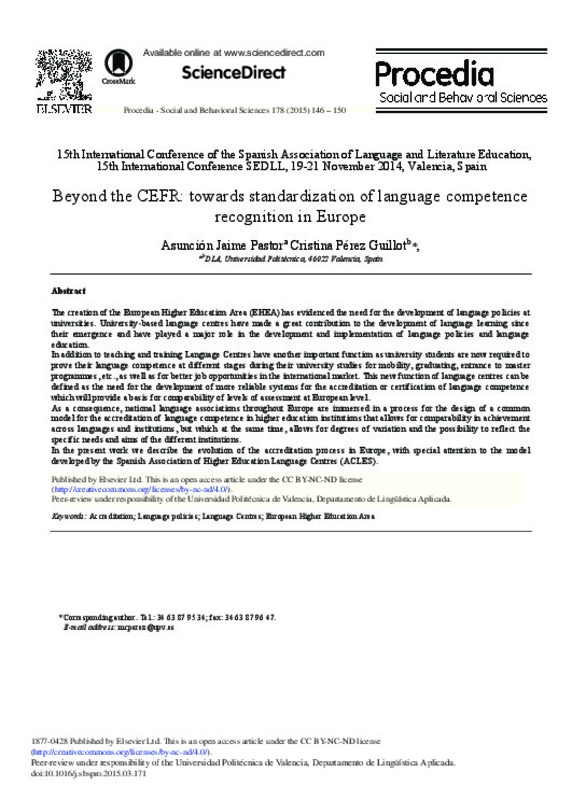JavaScript is disabled for your browser. Some features of this site may not work without it.
Buscar en RiuNet
Listar
Mi cuenta
Estadísticas
Ayuda RiuNet
Admin. UPV
Beyond the CEFR: towards standardization of language competence recognition in Europe
Mostrar el registro sencillo del ítem
Ficheros en el ítem
| dc.contributor.author | Jaime Pastor, Mª Asunción
|
es_ES |
| dc.contributor.author | Perez-Guillot, Cristina
|
es_ES |
| dc.date.accessioned | 2016-05-19T10:57:52Z | |
| dc.date.available | 2016-05-19T10:57:52Z | |
| dc.date.issued | 2015 | |
| dc.identifier.issn | 1877-0428 | |
| dc.identifier.uri | http://hdl.handle.net/10251/64398 | |
| dc.description.abstract | The creation of the European Higher Education Area (EHEA) has evidenced the need for the development of language policies at universities. University-based language centres have made a great contribution to the development of language learning since their emergence and have played a major role in the development and implementation of language policies and language education. In addition to teaching and training Language Centres have another important function as university students are now required to prove their language competence at different stages during their university studies for mobility, graduating, entrance to master programmes, etc., as well as for better job opportunities in the international market. This new function of language centres can be defined as the need for the development of more reliable systems for the accreditation or certification of language competence which will provide a basis for comparability of levels of assessment at European level. As a consequence, national language associations throughout Europe are immersed in a process for the design of a common model for the accreditation of language competence in higher education institutions that allows for comparability in achievement across languages and institutions, but which at the same time, allows for degrees of variation and the possibility to reflect the specific needs and aims of the different institutions. In the present work we describe the evolution of the accreditation process in Europe, with special attention to the model developed by the Spanish Association of Higher Education Language Centres (ACLES). | es_ES |
| dc.language | Inglés | es_ES |
| dc.publisher | Elsevier | es_ES |
| dc.relation.ispartof | Procedia Social and Behavioral Sciences | es_ES |
| dc.rights | Reconocimiento - No comercial - Sin obra derivada (by-nc-nd) | es_ES |
| dc.subject | Internationalization | es_ES |
| dc.subject | Language Accreditation systems | es_ES |
| dc.subject | Certification models | es_ES |
| dc.subject.classification | FILOLOGIA INGLESA | es_ES |
| dc.title | Beyond the CEFR: towards standardization of language competence recognition in Europe | es_ES |
| dc.type | Artículo | es_ES |
| dc.type | Comunicación en congreso | |
| dc.identifier.doi | 10.1016/j.sbspro.2016.03.171 | |
| dc.rights.accessRights | Abierto | es_ES |
| dc.contributor.affiliation | Universitat Politècnica de València. Departamento de Lingüística Aplicada - Departament de Lingüística Aplicada | es_ES |
| dc.description.bibliographicCitation | Jaime Pastor, MA.; Perez-Guillot, C. (2015). Beyond the CEFR: towards standardization of language competence recognition in Europe. Procedia Social and Behavioral Sciences. 178:146-150. doi:10.1016/j.sbspro.2016.03.171 | es_ES |
| dc.description.accrualMethod | S | es_ES |
| dc.relation.conferencename | 15th International Conference of the Spanish Association of Language and Literature Education | |
| dc.relation.conferencedate | November 19-21, 2014 | |
| dc.relation.conferenceplace | Valencia, Spain | |
| dc.relation.publisherversion | http://dx.doi.org/10.1016/j.sbspro.2015.03.171 | es_ES |
| dc.description.upvformatpinicio | 146 | es_ES |
| dc.description.upvformatpfin | 150 | es_ES |
| dc.type.version | info:eu-repo/semantics/publishedVersion | es_ES |
| dc.description.volume | 178 | es_ES |
| dc.relation.senia | 291540 | es_ES |








